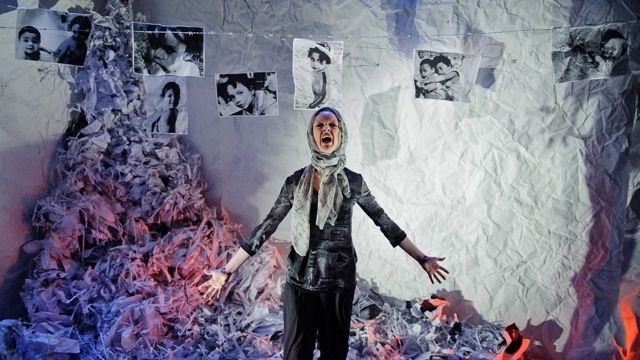Medea of Baghdad
Playwright Ali Alizadeh’s Medea of Baghdad is a monologue that places the ancient Greek tragedy written by Euripides into a modern context. Intriguingly, his Medea (Miranda Nation) is a wide-eyed young Australian university student who falls in love with an Iraqi asylum seeker while he’s in detention. With a setting straight from the front pages of our newspapers, and an ancient myth to refer to, Medea of Baghdad promises fresh insights into an up-to-the-minute contemporary issue.
While Nation’s performance is strong and nuanced, creating vivid and moving moments, the work overall seems to rely too much on familiarity with the Medea myth to give it meaning. This is most evident in the play’s ending, when Medea stops short of answering the number one question that hangs over her. It’s surprising that the play would sidestep this crucial question. How can we fully appreciate who Medea is and learn from what she's experienced without knowing the final details of her story?

We first meet Medea when she is a nameless, troubled young woman who is striving to share her painful story. Nation invites our sympathy quickly. She stands amidst bundles of scrap paper, and looks incapable of doing anyone any harm. She recounts her story underneath a string of haunting photocopied images of two innocent children, whom she refers to as the “apple of my eye”. We sense that her children are gone, but we don’t know who was responsible, or why it happened.
Nation provides all the voices for the characters and she has terrific range. She takes a character that seems so earnest and sweet into a dark, violent place and makes it credible. The scene in Iraq when she places a hijab over her head is handled with grace and delicacy. Alizadeh’s descriptions of Baghdad, strewn with rubble, divisive slogans, and soon enough, dead bodies, are poignant. His motif of an Iraqi child mistaken for a suicide bomber could serve as a metaphor for how the US and its allies have treated Iraq. Disturbingly, Medea doesn’t respond to all this in the way we’d hope. Instead of being appalled by the sight of blood on the streets of Baghdad, she’s dazzled by it. We worry about where this is going to lead.
Medea of Baghdadis an evocative piece of theatre, and Nation succeeds in taking us with her on a journey to a dark place. But we’re left wondering if we really know this woman at all.
Sara Bannister
To keep up with the latest news and reviews at Stage Whispers, click here to like us on Facebook, or follow us on Twitter.
Subscribe to our E-Newsletter, buy our latest print edition or find a Performing Arts book at Book Nook.

